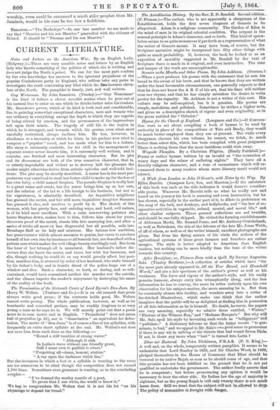Guy Waterman. By John Saunders. (Tinsley.)--" Guy Waterman' is the
kind of failure a clever novelist makes when he goes out of his natural line to enter on one which he thinks better suits his readers. Mr. Saunders's power, which of its kind ia both real and considerable, lies in painting somewhat exceptional characters, men and women who are ordinary in everything except the depth to which they are capable of being stirred by emotion, and the permanence of the impressions left upon their minds. The tragedy of still life is the region in which he is strongest, and towards which his genius, even when most carefully restrained, always inclines him. He has, however, in obedience to a necessity at which he hints in his preface now tried to compose a " popular " novel, and has made what for him is a failure. His story is eminently readable, for his skill in the management of separate scenes never deserts him, it is extremely well written, and it contains one finished and most interesting character, But its plot and its denouement are both of the true sensation character, that ia, so utterly improbable and violent as to destroy half the pleasure the reader might otherwise derive from artistic episodes and well-told inci- dents. The plot may be shortly described. A nurse has in the most pre- posterous way contrived to steal her foster-child to make up for the loss of her own baby, a child named Stephen. The pseudo-Stephen is really heir to a great name and estate, but the nurse brings him up as her own, and the relation of the lad to a life foreign to his instincts, but not to his experiences, is admirably described. An inquisitive neighbour has guessed the secret, and her still more inquisitive daughter Susanna has guessed it also, and resolves to profit by it. The sketch of this woman, with her pretty face, and enticing ways, and hard, evil nature, is of its kind most excellent. With a calm unswerving patience she hunts Stephen down, makes love to him, follows him about for years, discovers proof of the secret, cheats him into marrying her, and after a series of tricks all more or less disgraceful but all possible, sails into Brimhape Hall as its lady and mistress. Her intense low ambition, her perseverance which almost amounts to genius, her crave to convince herself of her own rise by insolence to all beneath her, are described with a patient care which makes the evil village beauty startlingly mai. But from the hour of her triumph all is unnatural. Her husband's father dis- covers that she know the secret, and taxes her with her baseness, and she, though nothing he could do or say would greatly affect her posi- tion, murders him, is arrested by order of her husband, who stabs himself by his father's body, and in frantic dread of the police leaps out of a window and dies. Such a character, so hard, so daring, and so self- contained, would have committed neither the murder nor the suicide, and the climax impairs the reader's enjoyment by destroying his sense of the reality of the book.






























 Previous page
Previous page